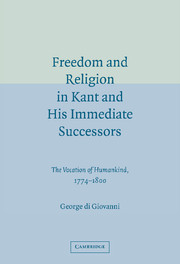Book contents
- Frontmatter
- Contents
- Preface
- Abbreviations
- 1 Introduction: The Vocation of Humankind, 1774
- 2 The Taming of Kant: Popular Philosophy
- 3 The Intractable Kant: Schultz, Jacobi, Reinhold
- 4 Of Human Freedom and Necessity
- 5 Kant's Moral System
- 6 The Difference That Fichte Made
- 7 The Parting of the Ways
- 8 The Vocation of Humankind Revisited, 1800: Conclusion
- Notes
- Bibliography
- Index
Preface
Published online by Cambridge University Press: 24 July 2009
- Frontmatter
- Contents
- Preface
- Abbreviations
- 1 Introduction: The Vocation of Humankind, 1774
- 2 The Taming of Kant: Popular Philosophy
- 3 The Intractable Kant: Schultz, Jacobi, Reinhold
- 4 Of Human Freedom and Necessity
- 5 Kant's Moral System
- 6 The Difference That Fichte Made
- 7 The Parting of the Ways
- 8 The Vocation of Humankind Revisited, 1800: Conclusion
- Notes
- Bibliography
- Index
Summary
Many of my generation cut their Kantian teeth on Strawson's The Bounds of Sense (1966). Strawson's argument was that there is in Kant a powerful critical thesis about the conceptual a priori of experience combined, however, with what Strawson called a ‘transcendental story’ about an alleged unknown ‘thing in itself’, and about certain equally alleged a priori sensible intuitions of ‘space’ and ‘time’. According to Strawson, this transcendental story detracts from the analytical force of the first thesis. One should abstract from it if one wishes to appreciate Kant's lasting philosophical contribution. The argument was well presented and convinced many. But then Henry Allison came along (1983). Strawson was no historian of philosophy. He treated Kant as a contemporary in the same spirit (so Jonathan Bennett said somewhere about his own practice) as any of us would read and criticize the work of the colleague down the hall. Allison had, however, historical as well as philosophical credentials, and he argued, referring to Strawson explicitly, that there is no such thing in Kant as a transcendental story. The mirage of such a story appears only if one understands psychologically distinctions that were intended by Kant rather as conceptual markers that delineate the limits of possible human knowledge without, however, restricting human identity to just these limits. Allison based his argument on a close reading of Kant's text, and he convinced many. In North America at least, his position has since become the presupposition of much of Kantian scholarship.
- Type
- Chapter
- Information
- Freedom and Religion in Kant and his Immediate SuccessorsThe Vocation of Humankind, 1774–1800, pp. ix - xivPublisher: Cambridge University PressPrint publication year: 2005

